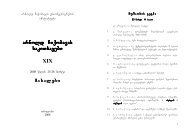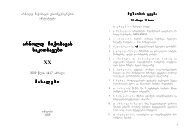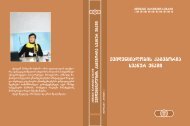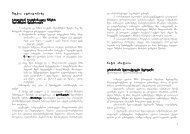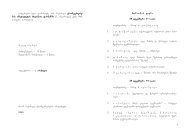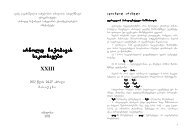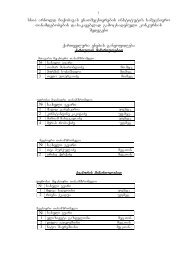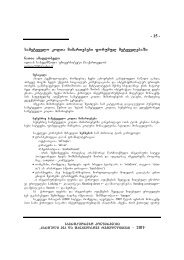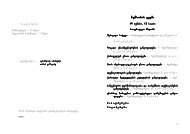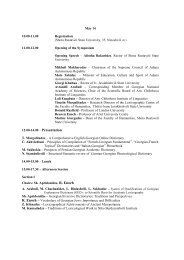5 r. a b a S i a (Tbilisi) bgeraTSesatyvisobis erTi rigisaTvis qarTvelur ...
5 r. a b a S i a (Tbilisi) bgeraTSesatyvisobis erTi rigisaTvis qarTvelur ...
5 r. a b a S i a (Tbilisi) bgeraTSesatyvisobis erTi rigisaTvis qarTvelur ...
Create successful ePaper yourself
Turn your PDF publications into a flip-book with our unique Google optimized e-Paper software.
omonimur gagebas Seicavs zogjer orpiriani da sampiriani<br />
gardamavali zmnebi: SemosWris is mas da SemosWris is<br />
mas mas; Sehzels is mas da Sehzels is mas mas; gardahyris is<br />
mas da gardahyris is mas mas dasdebs is mas da dasdebs is<br />
mas mas da a.S.<br />
K. G i g a s h v i l i (Telavi)<br />
Cases of Morphological Homonymy in Georgian<br />
Language Conncted with the Verb According to the<br />
Language of XII – XVIII Centuries Works<br />
Changes happening inside morphological categories of verb that perfectly<br />
revealed in the works of the Middle Ages, caused co-existence of parallel - new<br />
and old forms. One of the most significant in this period was the process of moving<br />
into new system of aspect which had a great influence on formation of conjugational<br />
system on the one hand and on the function of rows on the other.<br />
Connection of the meaning of future tense with the prefix forms of present tense<br />
and formation of future tense rows caused the changes in the meaning of verbs<br />
in proper time. Formation of Dynamic Passives and Future tense rows of Active<br />
Voice happened by simple adding of prefix and designing of appropriate verb<br />
rows of Stative Passive and Middle Voice happened differently, mainly on the<br />
basis of borrowing. Some of the present tense forms of the verb moved into future<br />
tense and acquired other forms for the present tense that provided the appearance<br />
of homonymic forms in transitional period. The verbs of this type in the<br />
middle Georgian equally belongs to the present and future forms of the verb.<br />
For example: the following Georgian verbs _ eKofis, eKofoe<br />
foda,<br />
eKofo<br />
fodes<br />
consequently<br />
(according to the context) may be in present continuous//present conjunctional<br />
and at the same time in the future//in the special form of conditional<br />
construction and in the future conjunctional. According to A.Shanidze :”The reason<br />
of moving of such kind of tense can be explained by the fact that the appropriate<br />
forms of the verb in the second series kept the understanding of full<br />
aspect without prefixes and the forms of the verb of the first series followed<br />
129



